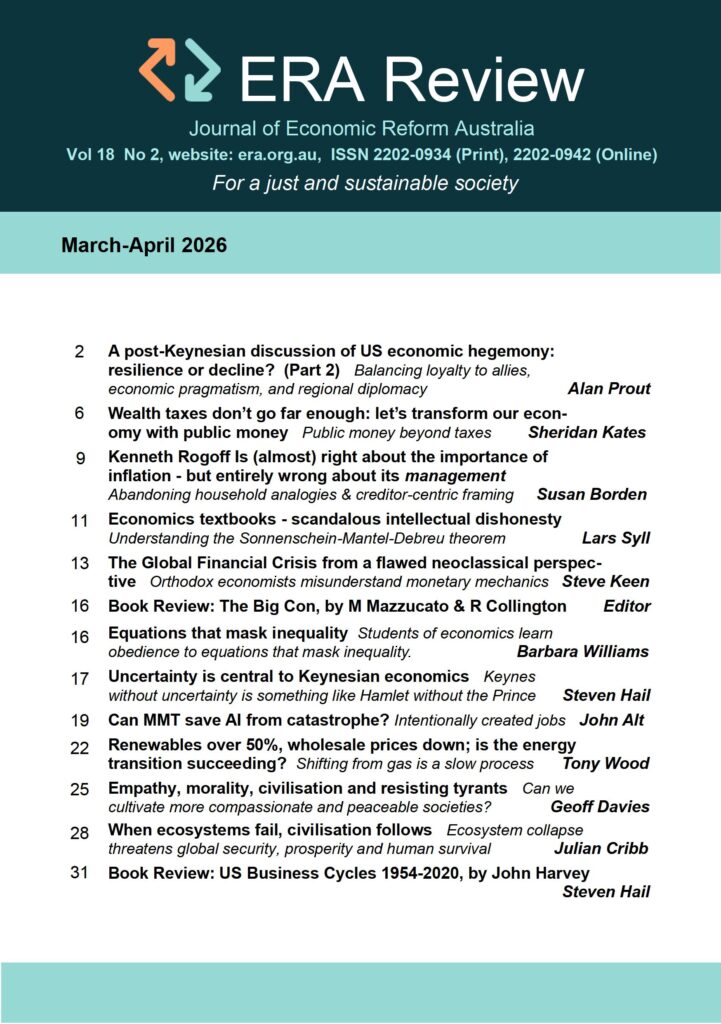Systemic Barter as an alternative to Money
Alan Ecob
1).Full-product Barter
This means the free exchange of usable goods and services by consenting persons as an alternative to money-based buying and selling. Such activity is ferociously suppressed by the ATO as “defrauding the revenue.” All the ATO allows as so-called ‘barter’ is the partial offsetting of overhead margins in such manner that enterprise profitability is not thereby reduced.
2).Examples of Genuine Barter
When I was a boy living in the weekender village of Kurnell (the Birthplace of Australia) seven miles south of Sydney, twelve men, assisted by their families, working only at weekends through one year, built twelve first-class cottages for negligible money. The work atmosphere was fantastic. I’ll never forget it. It was a privilege to be allowed to participate.
If they had been ‘dobbed in’ to the ATO, I was later told (by a no-name Inspector’s voice on the phone) they would have been pursued “to the ends of the earth” to extract money from them equal to the market value of the cottages, plus penalties and fines “they just wouldn’t believe.”
I made the telephone call because during my working career with joinery shops and manufacturing plants, I had become aware of how common it had been for groups of employees (with management approval) to build furniture and even pre-fab housing components ‘of a weekend’ for personal use. In some cases costs of materials were deducted from holiday-pay entitlements. On one occasion I was so working in the furniture factory of a supplier when I was approached by two employees who had been so working nearby. “Need a hand?” I was asked. I knew what they were really asking. Was I a dinki-di tradesman? “No thanks, not really.” I didn’t take them long to establish that I complied. Today, with the general adoption of computers, such activity has been rigorously stamped out.
3).The Real Nature of our Money System
May I compound the iniquity of my earlier comment by listing out what I see as ERA reader accepted perceptions as to our now-global money system: a). ’Money’, actually credit simply created by increase in book debt, contributes nothing directly to the production of the real product we all need for
consumption and the building of the infrastructure required for a better world. b). Through inflation and compound interest, the system secures for itself an ever-increasing share of world economic activity, and pays grossly excessive personal incomes to its ‘big hitter’ executives.
c). It buys success for political parties who then legislate to further its objectives.
d). Through ownership and advertising it causes media such as newspapers and TV to influence our social perceptions and attitudes in ways it finds to be favourable.
Yet, I suggest, there is more! If by means of consolidated accounts we look at our world as one whole, from the perspective of all humankind as being its ultimate equity interest, then many may be surprised to find that: a). The system is privately owned! The structure is complex, and some components are established within governmental authority. But strategic elements, giving effective control, are privately owned. Perhaps 100 persons are the ultimate exercisers/owners of this control. Their interests are not quoted in the market-place. But none, we may be sure, would consider selling for less than a trillion dollars. What, anyway, would one do with the money? b). The system’s ‘products’ – of moneys – cost it nothing! The values which moneys represent are, in the last analysis, nothing other than expressions of community confidence that real value will be conveyed in the future. Such is the real nature of our money system. Through it, perhaps 100 persons, as unelected trillionaires, control the general direction of human endeavour. Peace or war, boom or bust, the future of the natural world, are all determined by their private preferences and proclivities.
4). What may be Changed?
Clearly, we must accept that the system has become entrenched. It may be not-unreasonably described as a cancer on the body social. From any orthodox direction, it would seem to be ineradicable. With some banks now accepted as being too big to be allowed to fail, there is no prospect whatsoever that the whole game may be directly challenged. The only hope is what may result because the 100 persons are also human beings. The message here presented is that the future of humankind is in their hands. And if they want it to be one of peace, hope, joy, and progress towards an ideal world, then socially-fostered computer-based systemic barter is the way to go. If this is of interest, then as an old-fashioned cost & management accountant, I can say more in detail.
Alan Ecob is a long-standing ERA member living in NSW































